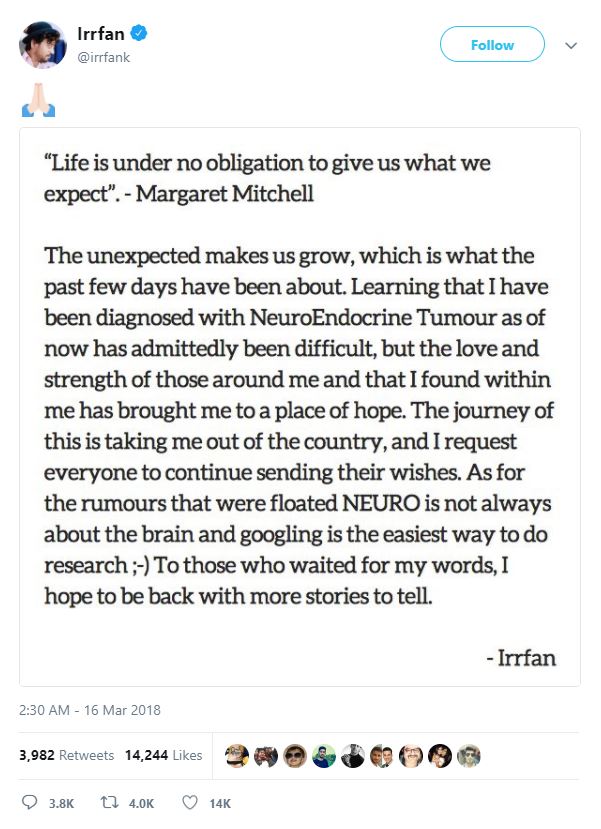Actor Irrfan Khan’s cryptic reference to neuro not always being about the brain is bang on. A quick explainer on neuroendocrine tumours
Like some of the multi-layered characters he has played, actor Irrfan Khan left a lot unsaid when he finally disclosed on Friday that he has been diagnosed with neuroendocrine tumour and is headed abroad for treatment. Neuroendocrine tumours come in many varieties, may or may nor be malignant and can happen in any of those parts of the body that have endocrine functions – that is secrete hormones.
Following up on his shocking announcement a few days back about suffering from a rare disease, this is what the powerhouse performer revealed on Twitter earlier today. “Learning that I have been diagnosed with neuroendocrine tumour as of now has admittedly been difficult but the love and strength of those around me and that I found within me has brought me to a place of hope. The journey of this is taking me out of the country and I request everyone to continue sending their wishes,” the actor wrote.

It was the latter part of the message that indicated that a lot has been left unsaid. “As for the rumours that were floated, NEURO is not always about the brain and googling is the easiest way to do research ;). To those who waited for my words, I hope to be back with more stories to tell.”
Wishing Irrfan all the best in his journey, Medibulletin takes you through neuroendocrine tumours.
What are neuroendocrine tumours?
Endocrine system of the body is made up of ductless glands that secrete hormones into the blood. Neuroendocrine refers to those cells that release hormones in response to specific nervous stimulation. Neuroendocrine cells are found in many parts of the body – in the brain, the adrenal gland, the lungs, gastrointestinal tract, even the reproductive organs form parts of various neuroendocrine axes of the body. A tumour is any unwanted growth in any part of the body. Tumours in neuroendocrine cells could be associated with but not limited to hormonal imbalance.
What are the various types of neuroendocrine tumours?
Given the variety in the neuroendocrine system of the body the effects of a neuroendocrine tumour could be diverse. They also come in many types, including phaeochromocytoma (happens in the adrenal gland, is usually benign but can be life-threatening), a neuroendocrine carcinoma which may happen in the brain, gut or lungs and an islet cell tumour that can affect production of insulin from the Islet cells of the pancreas. Genetically linked types like MEN -1 (multiple endocrine neoplasia) affecting multiple endocrine glands and Neurofibromatosis 1 (growth affecting multiple nerve fibres in the body) are also known. Some forms of skin cancer too are essentially neuroendocrine tumours. Skin cancers though are not very common among Indians.
What are the symptoms of neuroendocrine tumours?
They may be as diverse as the affliction itself. It could range from high blood pressure, headache, sweating, vomiting, palpitations, changes in bowel habits, a cough that does not go away or unexplained lumps in some part of the body. The symptoms really are about where the tumour is and how far advanced it is. Treatment decisions too depend on the location and stage of the disease. The common options are surgery, radiotherapy, chemotherapy, targetted therapy or drugs as the case may be.
How common is it?
As Irrfan had said right at the beginning, neuroendocrine tumours are rare. An analysis by the BYL Nair Hospital in Mumbai says: “The estimated prevalence of neuroendocrine tumors (NET) is 1 to 2 cases per 100,000 people, of which gastrointestinal (GI)
tract is the most common site. The incidence of GI –NET is around 67.5% amongst all NET.”


